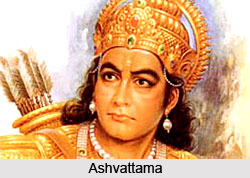 Sauptika Parva deals with the killing of the Pandava army by Ashvattama, Kripa and Kritavarma. This is the tenth Parva from among the eighteen parvas of Mahabharata. This Parva also consists of three sub-parvas. After Duryodhana was fatally wounded by Bhima in the battle of mace, Ashvattama, Kripa and Kritavarma rushed to him and consoled the eldest son of Dhritarashtra and promised before him to kill the Pandavas.
Sauptika Parva deals with the killing of the Pandava army by Ashvattama, Kripa and Kritavarma. This is the tenth Parva from among the eighteen parvas of Mahabharata. This Parva also consists of three sub-parvas. After Duryodhana was fatally wounded by Bhima in the battle of mace, Ashvattama, Kripa and Kritavarma rushed to him and consoled the eldest son of Dhritarashtra and promised before him to kill the Pandavas.
This parva or episodes provides an elaborate description of the three warriors Kritavarma, Ashvattama and Kripa. Kritavarma was a central Yadava warrior and chieftain. In the great battle at Kurukshetra, Kritavarma was an ally of the Kauravas against the Pandavas and commanded the Yadava army. He was one of the three who survived the entire Kaurava army and had helped Ashwatthama in working out his heinous night time massacre of Panchala warriors. In this episode, the slaughter of Dhrishtadyumna, the Pandava commander-in-chief, Shikhandi and the five sons of Draupadi by Ashwatthama along with Kritavarma are described in detail. After seeing Duryodhana stretched over the ground with severe pain, Ashwatthama vowed to Duryodhana to kill the Pandavas and thus Duryodhana asked Kripacharya to fetch a pot of water and anointed Ashwatthama as the commander of the Kuru army. The Ashwatthama embraced Duryodhana and went on to do the heinous works at night.
Kripacharya was the chief priest at the court of Hastinapur as described in the Sauptika Parva of Mahabharata. His mastery in the great battle of Kurukshetra is also narrated. He was appointed to be the teacher and preceptor of Parikshita, the grandson of Arjuna. Kripa was regarded as one of the eight Chiranjivin and he was one of the three survivors of the Kaurava army with Kritavarma and Ashwatthama.
In the great epic of Mahabharata, Ashwatthama was the son of Guru Dronacharya. He was also one of the seven Chiranjeevins. Ashwatthama got the permission from the dying Duryodhana to brutally murder Dhrishtadhyumna after the war had officially ended and he also promised to the king to kill the five Pandava brothers. The valiant son of Drona formed the resolution of slaying during the night the slumbering Pandavas and the Pancalas. However, he killed the five sons of Draupadi while they were sleeping. After killing the five sons of Pandavas, Ashwatthama severed the heads of the sons of the Pandavas and brought them to show his King Duryodhana who was by then at the point of death. When Duryodhana saw the heads of Pandava`s sons became very unhappy since Ashwatthama had killed the heirs of the Kuru dynasty, and then he gave up his life. With this the narration of the Sauptika Parva of Mahabharata ends.












